Related Research Articles

Estonian is a Finnic language of the Uralic family. Estonian is the official language of Estonia. It is written in the Latin script and is the first language of the majority of the country's population; it is also an official language of the European Union. Estonian is spoken natively by about 1.1 million people: 922,000 people in Estonia and 160,000 elsewhere.

Tallinn is the capital and most populous city of Estonia. Situated on a bay in north Estonia, on the shore of the Gulf of Finland of the Baltic Sea, Tallinn has a population of about 461,000 and administratively lies in the Harju maakond (county). Tallinn is the main governmental, financial, industrial, and cultural centre of Estonia. It is located 187 km (116 mi) northwest of the country's second largest city, Tartu; however, only 80 km (50 mi) south of Helsinki, Finland, also 320 km (200 mi) west of Saint Petersburg, Russia, 300 km (190 mi) north of Riga, Latvia, and 380 km (240 mi) east of Stockholm, Sweden. From the 13th century until the first half of the 20th century, Tallinn was known in most of the world by variants of its other historical name Reval.

Tartu is the second largest city in Estonia after Tallinn. Tartu has a population of 97,435. It is 186 kilometres southeast of Tallinn and 245 kilometres northeast of Riga, Latvia. Tartu lies on the Emajõgi river, which connects the two largest lakes in Estonia, Lake Võrtsjärv and Lake Peipus. From the 13th century until the end of the 19th century, Tartu was known in most of the world by variants of its historical name Dorpat.

The history of Estonia forms a part of the history of Europe. Humans settled in the region of Estonia near the end of the last glacial era, beginning from around 9000 BC. Before German crusaders invaded in the early 13th century, proto-Estonians of ancient Estonia worshipped spirits of nature. Starting with the Northern Crusades in the Middle Ages, Estonia became a battleground for centuries where Denmark, Germany, Russia, Sweden and Poland fought their many wars over controlling the important geographical position of the country as a gateway between East and West.
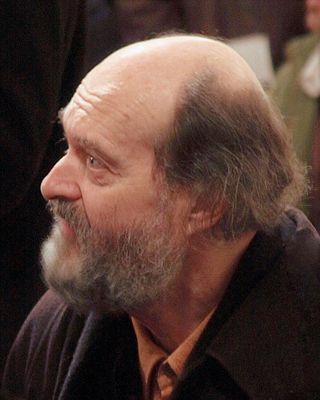
Arvo Pärt is an Estonian composer of contemporary classical music. Since the late 1970s, Pärt has worked in a minimalist style that employs tintinnabuli, a compositional technique he invented. Pärt's music is in part inspired by Gregorian chant. His most performed works include Fratres (1977), Spiegel im Spiegel (1978), and Für Alina (1976). From 2011 to 2018, and again in 2022, Pärt was the most performed living composer in the world, and the second most performed in 2019, after John Williams. The Arvo Pärt Centre, in Laulasmaa, was opened to the public in 2018.

Siim Kallas is an Estonian politician, former Prime Minister of Estonia, and former European Commissioner.

The Estonian War of Independence, also known as the Estonian Liberation War, was a defensive campaign of the Estonian Army and its allies, most notably the United Kingdom, against the Soviet Russian westward offensive of 1918–1919 and the 1919 aggression of the pro–German Baltische Landeswehr. The campaign was the struggle of the newly established democratic nation of Estonia for independence in the aftermath of World War I. It resulted in a victory for Estonia and was concluded in the 1920 Treaty of Tartu.

Football Club Infonet Levadia Tallinn, commonly known as FCI Levadia, or simply as Levadia, is an Estonian professional football club based in Tallinn that competes in the Meistriliiga, the top flight of Estonian football. The club's home ground is Lilleküla Stadium.
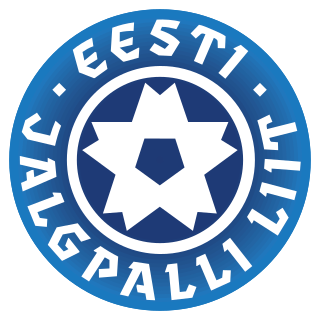
The Estonia men's national football team represents Estonia in international football matches and is controlled by the Estonian Football Association, the governing body for football in Estonia. Estonia's home ground is Lilleküla Stadium in the capital city Tallinn.

Toomas Hendrik Ilves is an Estonian politician who served as the fourth president of Estonia from 2006 until 2016.
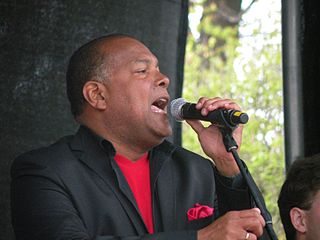
Dave Benton is an Aruban-born Estonian pop musician. He is one of the winners of the Eurovision Song Contest 2001. At the age of 50 years and 101 days at the time of his victory, Benton is the oldest singer ever to win Eurovision.

The Holocaust in Estonia refers to Nazi crimes during the occupation of Estonia by Nazi Germany.

The Estonian Orthodox Church of the Moscow Patriarchate is a semi-autonomous church in the canonical jurisdiction of the Patriarchate of Moscow whose primate is appointed by the Holy Synod of the latter.
Sport plays an important role in Estonian culture. Estonia first competed as a nation at the 1920 Summer Olympics, although the National Olympic Committee was established in 1923. Estonian athletes took part at every Olympic Games until the country was annexed by the Soviet Union in 1940. The 1980 Summer Olympics sailing regatta was held in the capital city Tallinn. Estonia has won most of its Olympic medals in wrestling, athletics, weightlifting, and cross-country skiing.

Estonia, officially the Republic of Estonia, is a country by the Baltic Sea in Northern Europe. It is bordered to the north by the Gulf of Finland across from Finland, to the west by the sea across from Sweden, to the south by Latvia, and to the east by Lake Peipus and Russia. The territory of Estonia consists of the mainland, the larger islands of Saaremaa and Hiiumaa, and over 2,300 other islands and islets on the eastern coast of the Baltic Sea, covering a total area of 45,335 square kilometres (17,504 sq mi). Tallinn, the capital city, and Tartu are the two largest urban areas of the country. The Estonian language is the indigenous and official language of Estonia. It is the first language of the majority of the country's population of 1.4 million, as well as the world's second-most spoken Finnic language.

The guerrilla war in the Baltic states was an insurgency waged by Baltic partisans against the Soviet Union from 1944 to 1956. Known alternatively as the "Forest Brothers", the "Brothers of the Wood" and the "Forest Friars", these partisans fought against invading Soviet forces during their occupation of the Baltic states during and after World War II. Similar insurgent groups resisted Soviet occupations in Bulgaria, Poland, Romania and Ukraine.
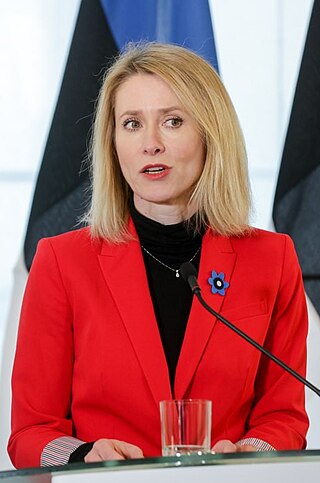
Kaja Kallas is an Estonian politician and the current prime minister of Estonia since 2021, the first woman to serve in the role. The leader of the Reform Party since 2018, she was a member of parliament (Riigikogu) in 2011–2014, and 2019–2021. Kallas was a member of the European Parliament in 2014–2018, representing the Alliance of Liberals and Democrats for Europe. Before her election to Riigikogu, she was a lawyer specialising in European competition law.

Uku Suviste is an Estonian singer-songwriter, pianist and music producer. He was scheduled to represent Estonia in the Eurovision Song Contest 2020 in Rotterdam, Netherlands, before cancellation of the competition that year. Instead, he represented Estonia in the Eurovision Song Contest 2021.
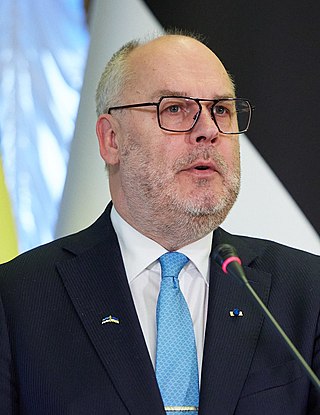
Alar Karis is an Estonian molecular geneticist, developmental biologist, civil servant and politician who, since 11 October 2021, has served as the sixth president of Estonia.

Hannes Walter was an Estonian war historian.
References
- 1 2 3 4 "Kandidaadid". info.ep2014.vvk.ee. Retrieved 16 March 2021.